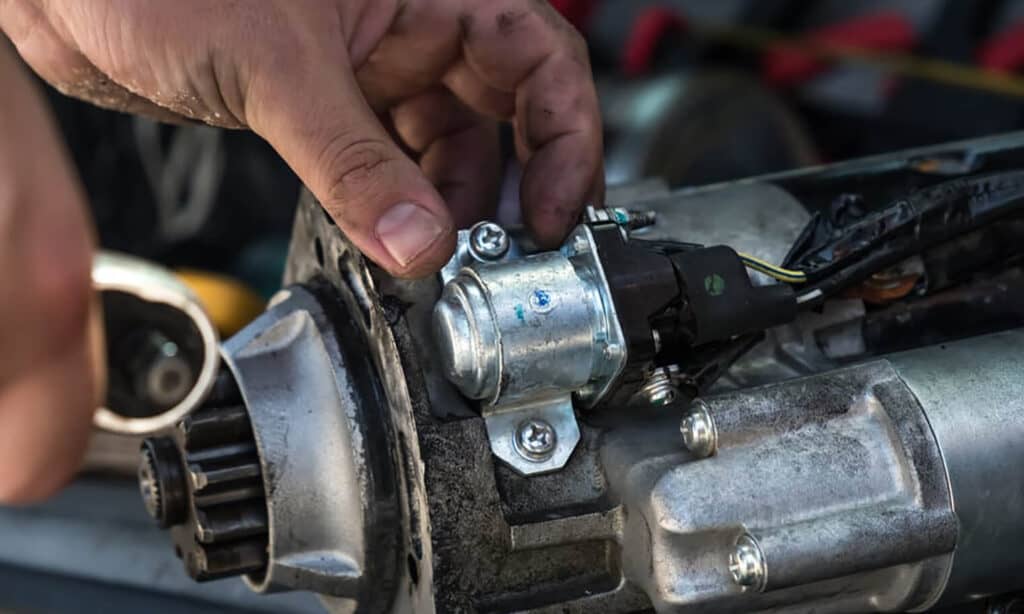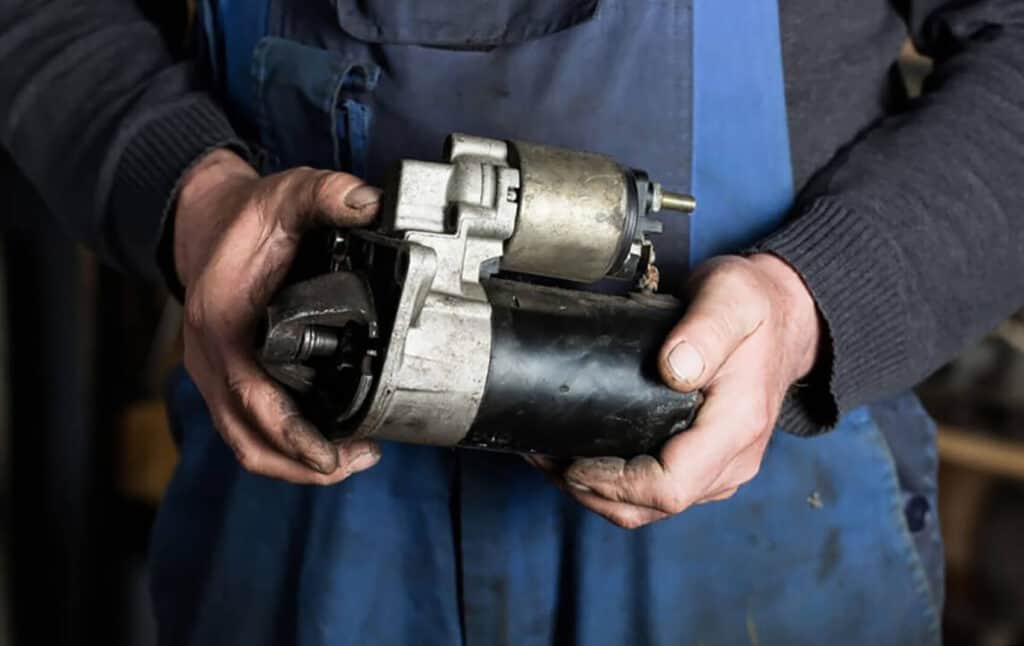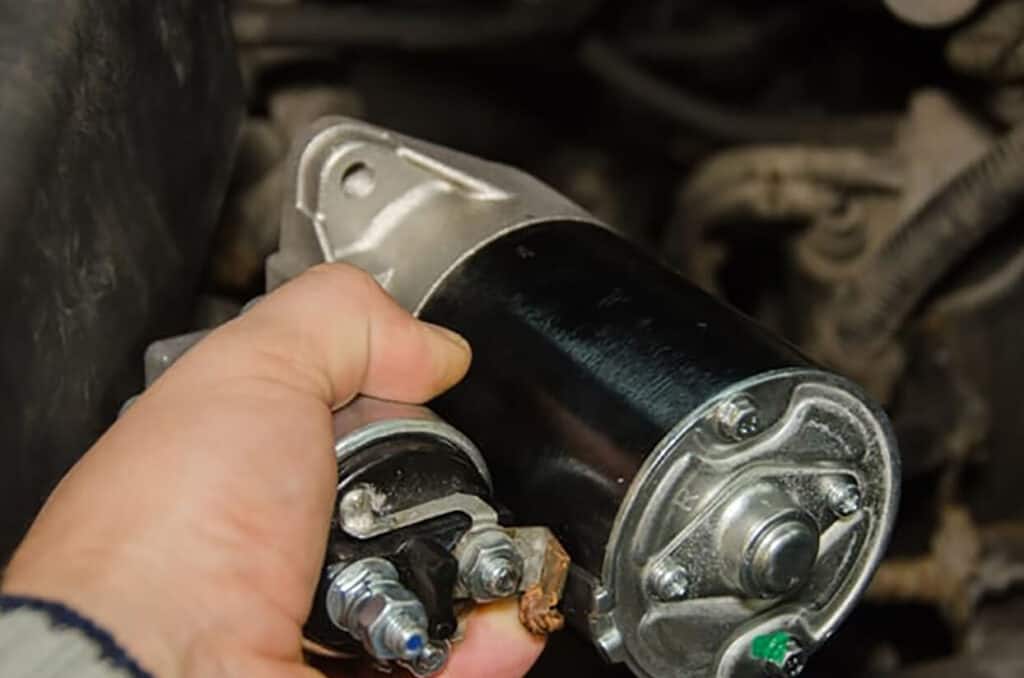Have you ever wondered how crucial a role the seemingly inconspicuous starter motor plays in your vehicle’s performance? Well, brace yourself for a surprise. This small device could make the difference between a smooth ride and a frustrating roadside breakdown.
Importance of Starter Motor in Your Vehicle’s Performance
When it comes to your vehicle’s performance, the starter motor plays a pivotal role that often goes unnoticed. Hidden away under the hood, the starter motor is akin to the heart in a human body. Just as our heart pumps life-giving blood throughout our system, the starter motor breathes life into your vehicle by jump-starting the engine. Without it, your car would be nothing more than a hunk of metal.
Think about it. You slide into your vehicle, turn the key, or press the button, and voila, your vehicle roars into life! This seamless initiation is all thanks to the modest starter motor.
Now, let’s address the elephant in the room – does the starter motor affect performance? The answer is an unequivocal yes! The starter motor’s performance directly influences the efficiency of your vehicle. A healthy starter motor ensures a quick start, enabling you to hit the road without delay. On the other hand, a faulty starter motor might make your vehicle as responsive as a sloth after a hefty meal.

The importance of the starter motor cannot be overstated. It’s not just a component that starts your vehicle, but it’s also a guardian that ensures your engine runs efficiently. Therefore, taking care of your starter motor is akin to ensuring your vehicle’s overall health. Much like how our heart needs regular check-ups to keep ticking, the starter motor needs routine maintenance for a smooth, trouble-free performance.
In the upcoming sections, we’ll delve into how you can recognize the signs of a healthy starter motor, and discuss why regular maintenance is essential for enhancing the life and efficiency of this little marvel of engineering.
Recognizing the Health of Your Starter Motor: Signs of a Good Motor
“Is my starter motor in good health?” This is a question that often leaves many car owners scratching their heads. But fear not, because discerning the health of your starter motor is simpler than you might think. Much like how a doctor checks your heart’s rhythm to gauge your health, you can do the same with your starter motor. Only, instead of a stethoscope, you’re using your ears and a keen sense of observation.
A healthy starter motor is a quiet yet efficient performer. It doesn’t seek attention with groans or grating noises but instead does its job swiftly and smoothly. When you turn the ignition key or push the start button, a good starter motor responds almost instantly, cranking up the engine with the finesse of a seasoned maestro leading an orchestra. There’s a specific rhythm to it – a steady hum that’s music to the ears of any motorist.
Moreover, a healthy starter motor doesn’t play hard to get. One turn of the key, one push of the button, and your vehicle should burst into life. If you find yourself repeatedly trying to start your vehicle, it’s akin to calling someone multiple times only to be met with voicemail. Clearly, something’s not quite right.
Apart from this, your vehicle’s overall performance can give you some valuable insights into the starter motor’s health. If you notice that your vehicle has become sluggish over time, it’s like a performance athlete suddenly struggling to keep pace. This could be an indication that your starter motor is not performing at its best.
The Impact of Starter Motor on Vehicle Performance
The performance of your vehicle and the health of your starter motor are intertwined like the strands of a DNA helix. You can’t affect one without impacting the other. An ailing starter motor can play the spoilsport in your vehicle’s symphony of performance, causing it to falter and stutter.
Imagine you’ve got a big day ahead. You’re dressed and ready to conquer the world. You hop into your car, turn the key, and… instead of a smooth roar, your car groans back at you like a grumpy teenager on a Monday morning. Not exactly the start you had in mind, right?
That, my friend, is the first sign of a weakening starter motor and a symptom of its adverse impact on your vehicle’s performance. An underperforming starter motor can slow down your vehicle’s responsiveness, leading to a sluggish start, or worse, a complete non-start. It’s like trying to run a marathon with a sprained ankle; you may eventually get there, but it’s going to be a painful and tedious journey.
Furthermore, a weak starter motor can lead to excessive fuel consumption. Like a campfire needing more wood when it starts dying out, a failing starter motor requires more energy to function. This means your engine has to work harder, burning more fuel in the process, and leading to a decrease in your vehicle’s overall fuel efficiency.
So, if you find yourself in a scenario where you’re constantly late to appointments because your car took its sweet time to start, or you’re visiting the gas station more frequently than your favourite coffee shop, you might want to check on the health of your starter motor. These are clear signs that your starter motor could be on the verge of retirement, impacting your vehicle’s performance, efficiency, and, not to mention, your schedule.
The Importance of Regular Maintenance: Extending the Life and Efficiency of Your Starter Motor
Why should you bother with starter motor maintenance? Think of it this way: maintenance is to your starter motor what regular exercise and a balanced diet are to you. It’s a proactive approach to keeping it in shape, enhancing its performance, and extending its life. Without regular check-ups, minor issues can go unnoticed, only to grow into significant, costly problems – the kind that can make your wallet shriek in horror.
Regular maintenance is akin to taking your starter motor for routine health check-ups. Small signs of wear and tear, which can snowball into serious issues if overlooked, are caught early on. Addressing these minor issues promptly is like nipping a potential problem in the bud, saving you from future headaches, or in this case, vehicle aches.
A well-maintained starter motor performs at its peak, ensuring your vehicle starts quickly and runs smoothly. It’s like tuning a musical instrument to ensure it hits the right notes. Moreover, maintenance reduces the chances of unexpected breakdowns, saving you from the horror of being stranded in the middle of nowhere with a vehicle that’s decided to play dead.
In addition to enhancing the power and life of your starter motor, regular maintenance helps keep your vehicle fuel-efficient. It’s like ensuring your vehicle is on a balanced diet, where it’s not consuming more fuel than necessary. This, in turn, helps you save on fuel costs in the long run.
In essence, maintaining your starter motor is an investment that pays off manifold. It keeps your vehicle in top shape, reduces the risk of unforeseen breakdowns, extends the life of your starter motor, and keeps your wallet happy by preventing expensive repairs.
Now, having emphasized the importance of regular maintenance, the next question that naturally arises is – how can you enhance the power of your starter motor?

Enhancing the Power of Your Starter Motor: A Guide
Wondering how to turn your starter motor from a sluggish runner into a sprinter? Well, enhancing the power of your starter motor is not some arcane science or magic trick. It’s a meticulous process, which if followed regularly, can work wonders for your vehicle’s performance. And just like how you would take care of a prized possession, your starter motor needs some TLC too!
Firstly, cleanliness is key. Your starter motor can be a magnet for dirt, grime, and dust, which can accumulate over time and hamper its performance. So, ensure it gets a good cleaning at regular intervals. It’s like giving your starter motor a spa day, and trust me, it will thank you with improved performance.
Secondly, lubrication is vital. Think of your starter motor as an athlete. Just as a runner needs to keep their joints well-oiled for a smooth performance, your starter motor needs regular lubrication to function effectively. Ensure that its gears are adequately greased to avoid any friction that might cause wear and tear.
Thirdly, the prompt replacement of worn-out parts can prevent a domino effect of issues. Just as a cracked window can shatter with a single knock, a worn-out part can lead to a breakdown of your starter motor. Regular checks can help identify any such components that need replacing, thereby preventing potential motor failures.
Lastly, a proper power supply is essential. A starter motor runs on the electricity provided by the vehicle’s battery. If the battery is weak, it’s like asking an athlete to run a race on an empty stomach. So, ensure your battery is in top-notch condition, providing your starter motor with the ‘fuel’ it needs.
Enhancing the power of your starter motor might seem like a Herculean task, but with regular maintenance and a keen eye for potential issues, you can ensure it stays in peak performance mode. Now, how do you tell if your starter motor might be in need of some TLC or perhaps even a replacement? Let’s explore
Signs Your Starter Motor Needs Replacing: What to Look Out For
Knowing when your starter motor is due for a replacement can be as crucial as spotting a leak in your home. It can be the difference between a minor repair and a major expense, not to mention the inconvenience of being stranded in the middle of a journey.
So, “how do you know if your starter motor needs replacing?” Here are some tell-tale signs that your starter motor might be singing its swan song.
• Difficulty in Starting the Vehicle: This is the equivalent of your starter motor coughing and spluttering. It’s one of the most common symptoms of a failing starter motor. If your vehicle doesn’t start up as quickly as it used to, or it takes multiple tries to get the engine running, your starter motor might be waving a white flag.
• Grinding Noise During Startup: If your vehicle greets you with a grinding noise when you try to start it, it’s not just being grumpy. A grinding noise often indicates that the gears that interact with the flywheel are worn out. It’s like your starter motor has a sore throat – it’s time to give it some attention.
• Intermittent Functioning of the Starter: Like a temperamental diva, a failing starter motor might choose to work one day and then refuse the next. This erratic behaviour is often a clear indication that your starter motor is on its last legs.
• Smoke or Burning Smell: If you see smoke coming from your vehicle or detect a burning smell, it’s an immediate sign of an issue. It could be due to a power surge or a short circuit in the starter motor. Either way, it’s a red flag that demands immediate attention.
• Free Spinning: This occurs when the starter motor runs as you turn the key, but it doesn’t engage the engine’s flywheel to start the car. It’s like trying to start a conversation with someone who isn’t listening. The effort is there, but the connection is missing.
If you notice any of these symptoms, it’s time to give your vehicle some serious TLC. Remember, ignoring these signs could lead to further damage, not just to your starter motor but to other components as well. To avoid getting caught in a downward spiral of failing parts, it’s wise to bid farewell to your old starter motor at the right time.
But what are the factors that could lead to these problems in the first place? Let’s dive in

Potential Damages to a Starter Motor: Understanding and Prevention
When it comes to your starter motor, forewarned is forearmed. Knowing what can potentially harm your starter motor is the first step to prevention and extending its lifespan. So, let’s delve into what can damage a starter motor and how you can prevent it.
Extreme Weather Conditions: Just as you’d shiver in cold or feel sluggish in extreme heat, your starter motor too can suffer in harsh weather conditions. Cold weather can thicken motor oil, making it harder for the starter motor to get the engine going. Similarly, high temperatures can lead to overheating and damage the starter motor.
• Frequent Short Trips: Short trips can be like a quick sprint for your starter motor, not giving it enough time to fully recharge. This can lead to battery drainage over time, thereby putting extra strain on your starter motor.
• Electrical Issues: As the starter motor is an electric component, any electrical issues such as a weak battery, poor wiring or a malfunctioning alternator can affect its functionality and cause damage over time.
So, how do we keep these potential damages at bay? Regular inspections and preventive maintenance are the key.
• Combat Extreme Weather Conditions: Use appropriate oil for your vehicle based on the weather conditions. In cold climates, using a thinner oil can help, while a thicker oil would be better for warmer temperatures.
• Minimize Short Trips: If you are in the habit of taking frequent short trips, consider combining them. This would give your starter motor and battery enough time to recharge, extending their lifespan.
• Fix Electrical Issues Promptly: Regular checks can help identify and rectify any electrical issues promptly, preventing them from damaging your starter motor.
By understanding potential damages and implementing preventive measures, you can ensure your starter motor enjoys a long and vigorous lifespan. It’s all about proactive care, because as they say, prevention is better than cure!
Conclusion: Prolonging Starter Motor Life through Regular Maintenance
In conclusion, the longevity and performance of your starter motor largely depends on regular maintenance. Ignoring the needs of this essential component is much like avoiding going to the dentist — everything seems fine until, suddenly, it’s a root canal situation.
So, if you’re in Ontario and don’t fancy being stranded on the roadside due to a rebellious starter motor, get in touch with Uchanics. We’re a mobile mechanic company that caters to your vehicle’s needs at your convenience, enhancing the performance and life of your starter motor, saving you time and money and avoiding a tow.
